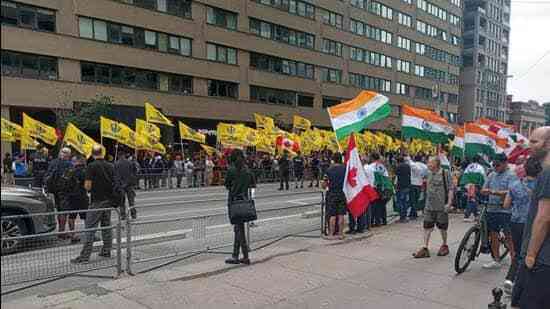
The Ministry of External Affairs (MEA) on Friday dismissed a purported memo, which was allegedly asked Indian diplomats in Canada to cultivate diaspora groups to confront Sikh extremist elements, labelling it as "fake". MEA stressed that no such memo has been issued by the Government of India.
Furthermore, MEA clarified that the document was aimed at misleading the public and reaffirmed on its commitment to uphold the integrity of the country's diplomatic personnel. It was alleged that the memo was issued by the former foreign secretary Vinay Kwatra.
In a statement, the External Publicity and Public Diplomacy Division (XP Division) of the Ministry of External Affairs, said: "The said GoI communication is fake".
"A memo allegedly secretly issued by the Government to Indian Embassies for mobilizing & training terrorists in the West is circulating on social media...This memo is fake," PIB Fact Check said in a post on X.
A memo allegedly secretly issued by the Government to Indian Embassies for mobilizing & training terrorists in the West is circulating on social media#PIBFactCheck
— PIB Fact Check (@PIBFactCheck) November 8, 2024
✔️This memo is #fake
✔️No such memo has been issued by GOI
✔️Be cautious! Send your GOI-related query to us. pic.twitter.com/cW8z96xJKl
The memo titled 'Action Points on Khalistan Extremism' had surfaced on social media. It allegedly asked Indian diplomats to "cultivate" Indian diaspora groups in Canada "as vital force in the street confrontations with Sikh extremists".
The alleged ‘memo’ also mentioned names of various Indian diaspora groups in Canada like the Indo-Canada Association (ICA), Indo-Canada Chamber of Commerce (ICCC), National Federation of Indian American Associations (NFIA), TiE Silicon Valley (TiE SV), Federation for India and Indian Diaspora Studies (FIIDS), and USIBC among others.
It also allegedly mentioned the need to undertake "special efforts to establish cooperation with moderate Sikhs to integrate the neutral Sikh community".
This comes as the diplomatic ties between India and Canada remain at an all-time low following Prime Minister Justin Trudeau's allegations regarding the involvement of Indian diplomats, including the Indian High Commissioner, in the killing of Khalistani terrorist Hardeep Singh Nijjar. Nijjar, a designated a terrorist by India's National Investigation Agency in 2020, was shot dead outside a Gurdwara in Surrey in June 2023.
Ottawa had named the Indian High Commissioner and other diplomats as "persons of interest" in the Nijjar case, claiming that it had provided India with "credible evidence" regarding the matter.
New Delhi has since then "strongly" rejected Canada's allegations several times, terming them "preposterous imputations" and an agenda of the Justin Trudeau government. India has also accused Trudeau government of giving space to "extremist" and "anti-India elements" in Canada.
The ties deteriorated further after a recent attack on a Hindu temple in Brampton where devotees and other people were attacked by Khalistani extremists on the temple premises. In another recent development, Canada had banned an Australian media outlet hours after it aired a presser of MEA S Jaishankar and his Australian counterpart Penny Wong.